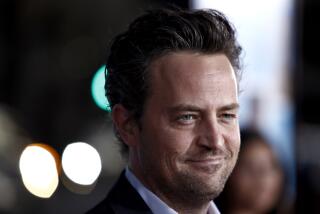Few nurses are 100% ‘Jackie’
- Share via
The premise
Jackie Peyton (Edie Falco) is an ER nurse at All Saints, a Catholic hospital in New York. Jackie is addicted to the painkiller Percocet (a blend of acetaminophen and the narcotic oxycodone), which she mixes with sweetener and takes throughout the day, often in coffee. On one occasion, the coffee is accidentally drunk by a co-worker, who gets very sick. On another, Jackie gives the spiked sweetener to a man who develops chest pain and collapses outside the hospital.
A patient, a child model, comes in to All Saints with head trauma after falling off his skateboard on a photo shoot where he wasn’t wearing a helmet. He has fractured his elbow in four places and will require surgery to relieve the pressure in his brain. Dr. Fitch Cooper (Peter Facinelli) also thinks he hears an aortic aneurysm in the boy’s abdomen, which will require additional surgery.
Dr. Eleanor O’Hara (Eve Best) disagrees with him, but Nurse Jackie (who has a mind of her own and frequently makes her own medical assessments in the series) stands up for him. Cooper turns out to be right. At another point in the episode, Jackie challenges Cooper on his tardiness in responding to a page on another patient (he has forgotten to turn on his beeper).
The medical questions
Wouldn’t a nurse who is addicted to narcotics lose her license to practice? Is it common for this drug to be added to sweetener? Is it likely that a non-addict would get sick from a dose of Percocet that is tolerated by an addict? Are narcotics effective at relieving the symptoms of a heart attack? Is an abdominal aneurysm a possible complication of trauma from a fall? Does a nurse have a legitimate and important role in challenging a physician’s diagnosis or behavior?
The reality
Some nurses who use drugs do eventually lose their licenses because of it, says Sandy Summers, co-author of “Saving Lives: Why the Media’s Portrayal of Nurses Puts Us All at Risk,” and executive director of the Truth About Nursing, a media advocacy group for nurses. By law, nurses will lose their license if they endanger patient safety or have been convicted of a crime related to their addiction (such as stealing opiates), says Dr. Timothy Fong, program director of UCLA’s Addiction Medicine Clinic. But nurses may first go through rehab programs without losing their license and can even return to practice, generally in areas such as dialysis where there are no narcotics, Summers says.
It is common for high-functioning addicts to hide the substances they abuse in food or drink, Summers says. Jim Adams, associate professor of pharmacology at USC, explains that this hides the bitter taste of the drug. Addicts who are doctors or nurses like Jackie can obtain controlled-release pills, which they then break into tiny pieces in order to get higher blood levels of the drug, Adams says. Addicts are tolerant and can withstand doses that could cause breathing difficulty or seizures in a non-addict. Narcotics (especially morphine) are used against chest pain caused by a heart attack, because they dilate the blood vessels and decrease the work of the heart. But these drugs can also stop breathing. Giving your stash of Percocet to an undiagnosed individual is reckless criminal behavior.
A fall cannot cause an aneurysm (a ballooning of the wall of a major artery such as the aorta), says Dr. Mark Adelman, chief of vascular surgery at New York University Langone Medical Center. But it could cause a different condition known as a dissection (a disruption between the layers of the wall of the artery), which can rupture. “This would almost never be audible by a stethoscope,” Adelman says. “A CT scan or ultrasound would be used to make the diagnosis.”
Catching physician errors, advocating for patients and making sure physicians are making the right diagnoses are among the most important job responsibilities of a nurse, Summers says: “Nurses are legally and ethically required to protect patients in this way. Nurses are an important check on physician power. Nurses are science professionals who save lives and improve outcomes through their independent assessments and interventions. Rarely, until ‘Nurse Jackie,’ have we seen such a depiction on television.”
--
Siegel is an associate professor of medicine at New York University’s School of Medicine.
More to Read
The complete guide to home viewing
Get Screen Gab for everything about the TV shows and streaming movies everyone’s talking about.
You may occasionally receive promotional content from the Los Angeles Times.






